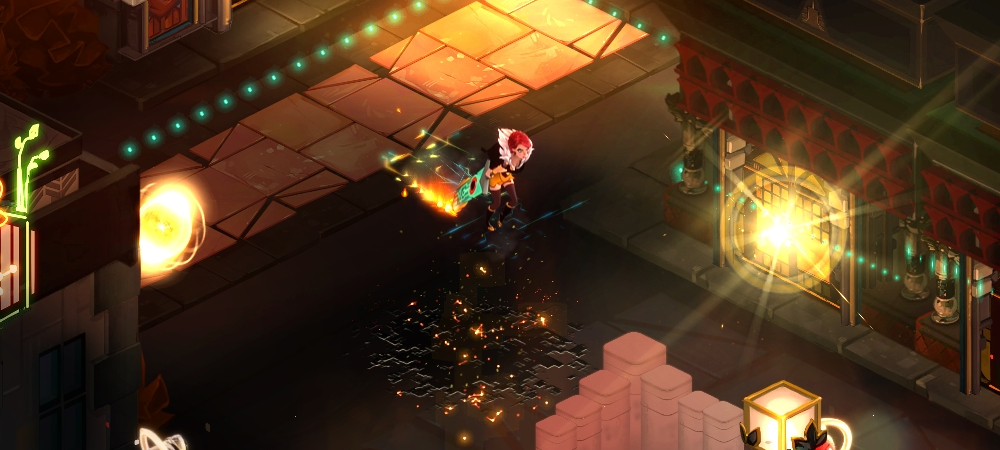Darren Korb talks Transistor’s eclectic, memorable soundtrack
As much as Jen Zee’s mood paintings and art catalyzed what would become Transistor early on, so too did Darren Korb’s music. The soundtrack is an important part of Transistor and while I’d like to be able to yell at you to go freely listen to it right now, there are some meaningful compositions that should first be experience in-game.
Making music is, “different at different stages of the process,” Korb said. “At the beginning, there aren’t a lot of other assets happening. There’s not a lot of other stuff that defines the tone of the game so I’ll kind of go off and try some things. I’ll come back like, ‘here’s a thing and it feels this way,’ and try to develop a center for the identity of music and the feel.
“As the process goes on, I can look at the art and look at the gameplay. That will affect and change the direction a little bit. Or I can regroup and go in a different direction. Once it’s in and once we get a better sense of where the game is going story-wise, well here’s a scene we need a specific thing for. It won’t be blind, throwing darts and it hits something.” That’s when you get tracks that should be enjoyed in-game, but, like with Bastion, the early music helps set a tone.
“I would say it has a darker vibe overall,” Korb said. “It has a little noir influence, at least for me. Where Bastion was sort of earthly and warm and frontier-sy, I wanted to go in a different direction. I wanted to keep it as eclectic as I could, but I tried to center it around electronic elements with some old world European influences. I wanted it to have a bit of a vintage feel, but to combine those things in a way that was compelling and with a little bit of post-rock and other things peppered in there.”
Transistor writer Greg Kasavin chimed in, “I think we like playing with anachronistic feelings in different ways. In Bastion, it’s primarily frontier-sy, this old world feeling, but sometimes it’s like, ‘wait a minute, that seems newer.’ It’s inverted on this game. Here it’s modern by default, but here’s the old world feelings where you’re like, ‘wait, is this the future?'”
The juxtaposition is meant, “to put the player in a unique space,” Korb said.
“It’s less about new, more about specific,” Kasavin said. “We knew as a starting point we were more interested in the cyberpunk aesthetic as opposed to the glossy, future, laser guns and spaceships type sci-fi. We didn’t want to do straight ahead cyber punk either, mostly out of respect because it’s been done so well so many times already. What are we contributing to this if it’s going to be flowing trench coats and giant magnums and sunglasses and pouring rain and stuff?”
Kasavin and artist Jen Zee have already talked about casting cyberpunk aside. “We have to find some reason for our version of this stuff to exist and that means trying to find another angle on it, Kasavin said. “Jen discovered stuff from an art standpoint pretty early on and Darren’s dabbling with music and various story tests and all that eventually led to the thing that we showed. But that all just took a while.”
All aspects of design inform one another. We’ve heard about the art or about relatively Supergiants’ lax planning. “The nature of game development is you have a bunch of people working separately on all these different disciplines and they can’t come together before a certain time in the project, Korb said. “At that point, then you can see what you have.”
“I’ve been smiling because I think of Heart of Darkness,” Kasavin chuckles. “No one goes native, having been left unchecked for too long. No one has a different understanding of the game as everyone else because you develop a shared intuition around it. So we try to have that balance where people get to do their individual work in the way that they think is best, like Jen making artwork or Darren making music, and then there’s the part where we’re constantly trying to make sure that it all fits together and feels right, which is an intuitive, ongoing process. We don’t necessarily know until we try it.”
And come together it did, with a droning, crooning coolness that challenges Bastion‘s warmth and just about everything that makes it up. Talking with Amir Rao, Greg Kasavin, Jen Zee and Darren Korb is instructive for their insight. It doesn’t clear up Transistor‘s aloofness, but this winding, exciting series has hopefully shown off the verbosity and hammered out ideas bubbling underneath it.





Published: May 23, 2014 04:00 pm